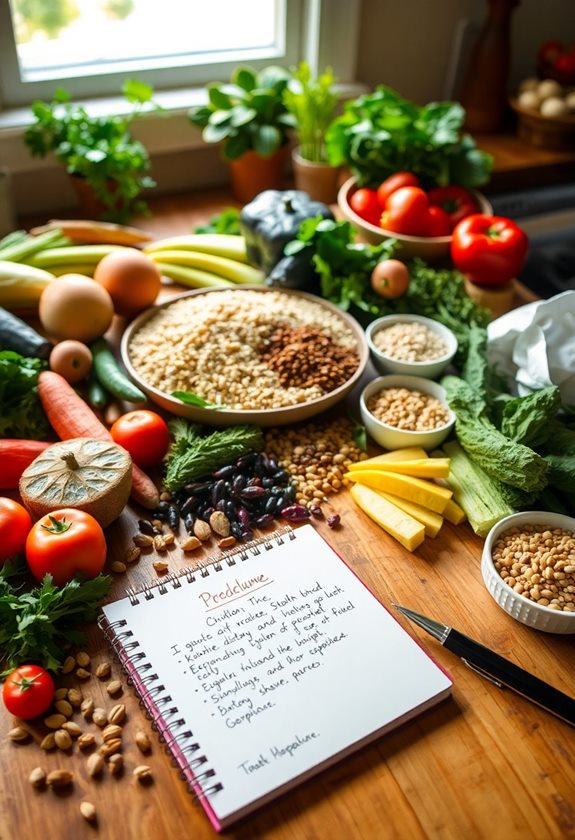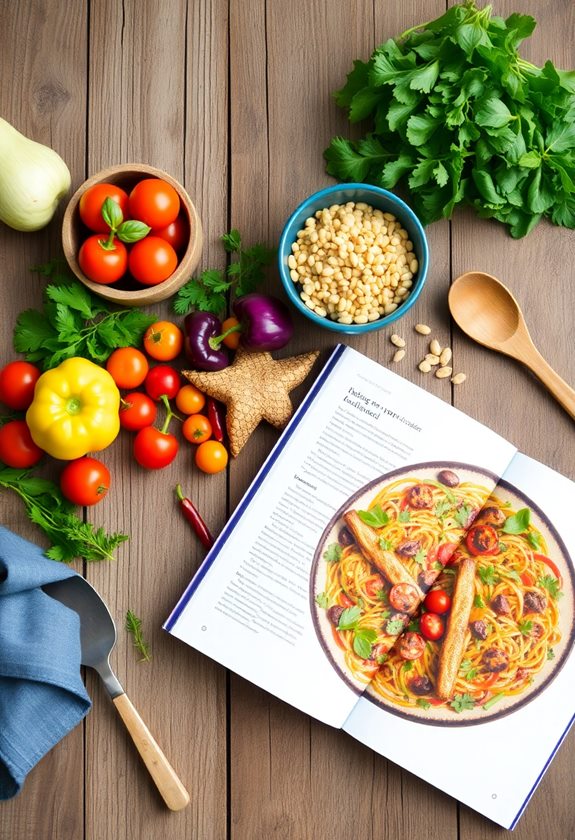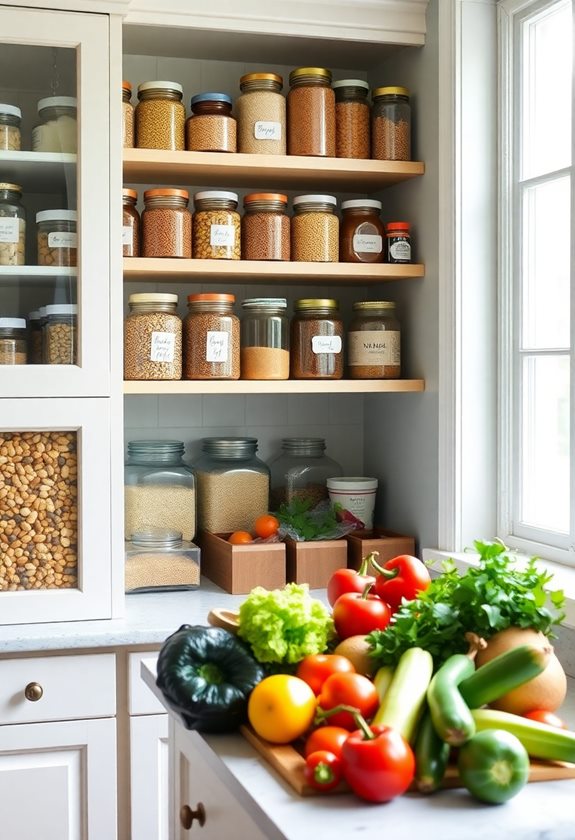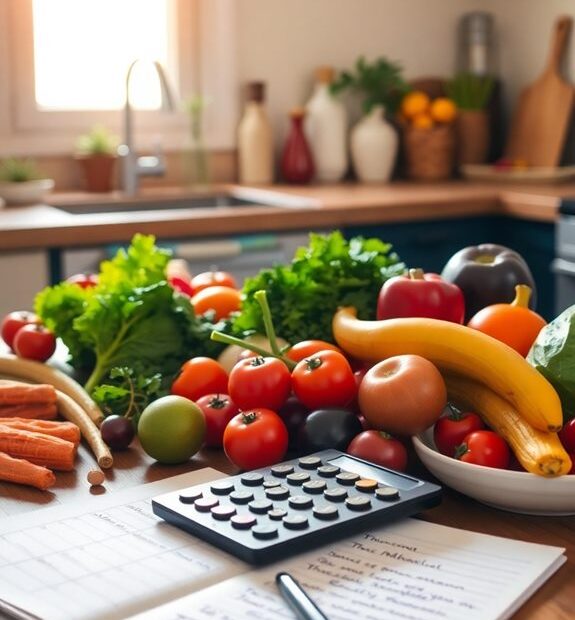Planning affordable meals on special diets can be a breeze! Start by understanding your dietary needs—this helps you make smart choices. Next, plan meals around sales at your grocery store; why not save money while shopping? Use seasonal ingredients for freshness and cost benefits. Consider batch cooking; making larger meals saves time. Embrace simple recipes that use fewer ingredients, making cooking less stressful. Don't forget to explore affordable substitutes for pricey ingredients, and keep a well-stocked pantry to avoid last-minute runs. With these tips, you can enjoy delicious meals while sticking to your budget. Does that sound helpful?
Key Takeaways
- Plan meals around weekly sales and discounts to maximize your budget and add variety to your diet.
- Utilize seasonal ingredients for freshness and lower prices, and visit local farmers' markets for affordable options.
- Keep a well-stocked pantry with essentials like grains, canned goods, and spices to simplify meal preparation and reduce impulse buys.
- Batch cooking saves time and money while ensuring healthy meals are readily available; freeze extras for convenience.
- Explore affordable ingredient substitutes to maintain variety and manage costs while adhering to dietary restrictions.
Understand Your Dietary Needs

When it comes to meal planning, understanding your dietary needs is essential for both health and budget. Have you ever felt lost in a grocery store, unsure of what to buy? Knowing your specific dietary requirements can help you make better choices. Whether you're avoiding gluten, managing diabetes, or following a vegan diet, you need to focus on what your body truly needs.
To start, consider keeping a food diary. This way, you can track what you eat and how it makes you feel. You'll find patterns and discover foods that work for you. 🥦 For example, if you notice that dairy makes you feel bloated, it might be time to explore alternatives like almond milk.
Next, educate yourself on food labels. Reading them can help you identify hidden ingredients that don't fit your diet. You might be surprised at what you find!
Lastly, don't hesitate to consult a nutritionist. They can give you tailored advice and help you create a plan that meets your needs. Understanding your dietary needs isn't just about health; it's about saving money and making informed choices. Your journey to better eating starts here! 🌱
Plan Meals Around Sales
Leveraging weekly sales can greatly reduce your grocery bills while keeping your meal plan exciting. By planning meals around what's on sale, you're not just saving money; you're also discovering new recipes and ingredients. Have you ever looked at your grocery store's weekly ad? It's a treasure map for meal planning!
Here's a simple way to organize your thoughts:
| Day | Sales Item | Planned Meal |
|---|---|---|
| Monday | Chicken | Grilled chicken salad |
| Tuesday | Broccoli | Stir-fried veggies |
| Wednesday | Rice | Chicken and rice bowl |
| Thursday | Ground beef | Tacos with toppings |
| Friday | Salmon | Baked salmon with veggies |
When you see chicken on sale, why not plan a salad or a stir-fry? It's all about flexibility. You can mix and match based on what's discounted. Plus, this method can help you avoid the last-minute rush to the store, which often leads to impulse buys. So, why not take a peek at those sales? You might just find inspiration for your next meal! 🍽️
Use Seasonal Ingredients

Incorporating seasonal ingredients into your meals not only enhances flavor but also keeps your grocery budget in check. When you choose fruits and vegetables that are in season, you're likely to find better prices and fresher options, which is similar to selecting high-quality materials for meal prep, like durable mason jars with measurable features. Have you ever tasted a perfectly ripe tomato in the summer? There's just nothing like it!
Here are some tips to help you make the most of seasonal ingredients:
- Visit local farmers' markets: You'll often find fresh, in-season produce at lower prices while supporting local farmers. 🌻
- Plan your meals around what's in season: Check produce guides to see what's available in your area.
- Try new recipes: Use seasonal ingredients to inspire you to try new dishes. Have you ever cooked with squash in the fall?
- Preserve extras: Buy in bulk when prices drop and freeze or can them for later use.
Using seasonal ingredients not only saves you money but also keeps your meals exciting and flavorful. So, next time you shop, think about what's in season. You'll be amazed at the difference it makes!
Cook in Batches
Cooking in batches not only saves you time but also helps you stick to your special diet without breaking the bank. Have you ever found yourself scrambling for dinner after a long day? By preparing larger quantities of food, you'll always have healthy meals ready to go. Using durable meal prep containers guarantees your meals stay fresh and organized, making your meal prep even more efficient.
Start by choosing a day to cook—maybe Sundays work for you. You can whip up a few recipes that fit your diet. For instance, if you follow a gluten-free plan, make a big pot of quinoa or a hearty vegetable soup. Portion them out into containers, and voilà! You've got meals for the week.
Why not take it a step further? You could freeze some of these meals for busy days. Just imagine opening your freezer to find a homemade meal waiting for you. It's like a little gift to your future self!
Plus, cooking in batches often means you'll save money on groceries. When you buy in bulk, you usually spend less. So, are you ready to give batch cooking a try? You might find that it makes sticking to your special diet not just easier, but also more enjoyable!
Embrace Simple Recipes

Embracing simple recipes can make meal planning on special diets a breeze. You don't need to spend hours in the kitchen or collect fancy ingredients. Instead, focus on easy meals that taste great and fit your dietary needs. Consider utilizing meal prep appliances that can streamline your cooking process and save space in your kitchen. Think about it: wouldn't it be nice to whip up something delicious without stress?
Here are a few tips to get you started:
- Use fewer ingredients: Choose recipes with five or fewer items. This keeps it simple and budget-friendly.
- One-pot meals: These save you time on cooking and cleaning. Toss everything in one pot for a tasty dish!
- Prep ahead: Cook in batches and store extras for quick meals later. It's a lifesaver during busy days.
- Explore simple proteins: Grilled chicken, beans, or eggs can be the star of many easy dishes.
Explore Affordable Substitutes
Finding affordable substitutes can further simplify your meal planning while adhering to special diets. Why spend a fortune on specialty items when you can find budget-friendly alternatives? Think about what you need and explore options that fit your dietary needs without breaking the bank.
Here's a quick table to get you started:
| Original Item | Affordable Substitute | Reason |
|---|---|---|
| Almond Milk | Soy Milk | Often cheaper and widely available |
| Quinoa | Brown Rice | Similar texture and filling |
| Coconut Flour | Oat Flour | Great for gluten-free baking |
| Agave Nectar | Honey or Maple Syrup | Sweetness without the price tag |
By using these substitutes, you can enjoy your meals without feeling deprived. Plus, it's fun to experiment! Have you tried using brown rice instead of quinoa? You might find you love it!
Keeping your meals both affordable and tasty is possible. So, get creative with your substitutes, and don't hesitate to share your discoveries with friends. After all, cooking should be a joyful experience. Happy meal planning! 🍽️
Keep a Well-Stocked Pantry

A well-stocked pantry is your secret weapon for affordable meal planning, especially when following special diets. When you have the right staples on hand, you can whip up tasty meals without breaking the bank. Think about it: how often do you stare at an empty fridge and wonder what to cook?
By keeping your pantry filled with essential items, you can make meal prep easier and more enjoyable. Here's what you should consider stocking up on:
- Grains: Quinoa, brown rice, or oats are great options.
- Canned goods: Beans, tomatoes, and coconut milk provide versatility.
- Spices and herbs: These add flavor without extra calories or cost.
- Nut butters: Perfect for quick breakfasts or snacks.
Having these items ready means you can mix and match to create various meals. For example, combine beans with rice and spices for a filling dish. Plus, you won't need to rush to the store for last-minute items. So, why not take some time to organize your pantry? With a little effort, you'll find meal planning becomes a breeze. Happy cooking! 🍽️
Frequently Asked Questions
How Do I Handle Food Allergies While Meal Planning?
To handle food allergies while meal planning, start by identifying allergens in ingredients. Read labels carefully, choose allergy-safe alternatives, and prepare meals that cater to your specific needs, ensuring you stay healthy and satisfied.
Can I Meal Prep for a Family With Different Dietary Needs?
Meal prepping for a family with different dietary needs is like juggling—challenging but possible. You can create versatile meals by cooking base ingredients and customizing them with individual toppings or seasonings to satisfy everyone's preferences.
What Are Some Budget-Friendly Protein Sources for Special Diets?
You can find budget-friendly protein sources like beans, lentils, eggs, and canned fish. Tofu and tempeh are also great options. Incorporating these into your meals can help meet various dietary needs without breaking the bank.
How Do I Store Leftovers Safely for Special Diets?
Did you know nearly 40% of food goes to waste? To store leftovers safely, cool them within two hours, use airtight containers, and label them. Keep your fridge at 40°F or below to maintain freshness.
Are There Apps to Help With Meal Planning on a Budget?
Yes, there are several apps that can help you with budget meal planning. Apps like Mealime, Yummly, and Paprika let you customize recipes, create shopping lists, and track expenses, making meal planning easier and more affordable.

